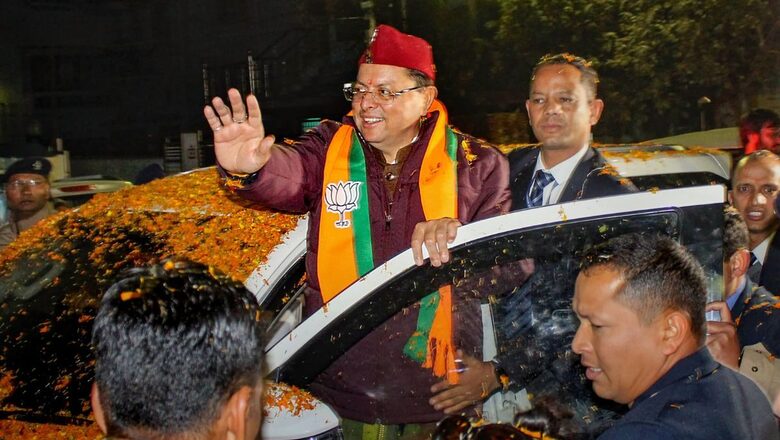
views
The Pushkar Singh Dhami government in Uttarakhand has set the ball rolling for other BJP states to bring in a Uniform Civil Code. Ahead of Lok Sabha polls this year, implementing the “unfinished agenda” could be a key election plank for the party.
The Union government has told the Supreme Court that there are various issues linked to UCC and hence, the Law Commission has been tasked to submit a detailed report.
“In view of the importance of the subject matter and sensitivity involved which requires in-depth study of the provisions of various personal laws governing different communities, the Central government requested the Law Commission of India to undertake examination of various issues relating to uniform civil code and to make recommendations,” an affidavit by the Centre in SC read.
Law Minister Arjun Ram Meghwal and former law minister Kiren Rijiju have, however, made the BJP strategy clear — there is constitutional freedom available to states if they want to come up with their own Uniform Civil Code.
The Uttarakhand assembly, after passage of the UCC Bill, has sought the Governor’s consent. Next will be the President’s nod after which UCC can be implemented in the state.
Speaking to CNN-News18, Dhami said the process of framing the rules and procedures of implementation has already started. A gazette notification will announce the date from which UCC would become a reality in the hill state.
Gujarat
Gujarat was one of the first states which, ahead of assembly polls in 2022, promised a Uniform Civil Code. The state is yet to notify the committee for drafting of the code but the Uttarakhand Bill could provide a starting point to the state. Justice (Retired) Ranjana Desai, who headed the Uttarakahnd UCC drafting committee, could be given the task of doing the same for Gujarat.
Assam
The north-eastern state has announced an anti-polygamy law in the ongoing assembly session. That, along with a ban on child marriage, could be the first steps towards a uniform code governing marriage and divorce. The state government is aiming to table this law in February. An expert committee, after taking more than 150 suggestions, has already submitted a report to the state government. Chief minister Himanta Biswa Sarma has said the legal department is vetting the draft law made and the final report could be ready soon.
Rajasthan
Ministers Kanhaiya Lal Choudhary and Madan Dilawar have spoken in favour of a UCC for the desert state. Chaudhary said, “We are making an effort to ensure that Rajasthan becomes the state after Uttarakhand (to implement the UCC Bill)… The chief minister is in support of this. He has given directions and work will be done soon.” BJP functionaries say a drafting committee with judicial experts, bureaucrats and government representatives could start the work for framing a draft Bill soon. The draft report would then be put up for public comments. The Rajasthan government is aiming to bring a draft Bill in the next assembly session.
Challenges
Exemption: The Uttarakhand UCC has exempted tribals on grounds that they enjoy protection under the Sixth Schedule of the Constitution. Uttarakhand has about 3 per cent tribal population. Tribal population in Assam, as per the 2011 Census, is about 14 per cent. In Gujarat, it is 15 per cent. Granting exemption to such a significant section of the state will lead to questions about the law’s uniformity.
In Conflict with Constitutional Rights: Critics have argued that UCC is infringement of constitutionally guaranteed Right to Freedom. Article 25 (freedom of conscience and free profession, practice, and propagation of religion), Article 26 (freedom to manage religious affairs), and Article 29 (i) – Cultural and linguistic freedom granted to Minorities — all provide fundamental rights with respect to religion. Even in the Uttarakhand Assembly, opposition MLAS asked how Iddat — a period of grieving by a Muslim woman for her dead husband — can be infringed upon by the state. Adoption, denied by Muslim personal law and allowed by UCC, is also being cited as a deliberate attempt to infringe upon constitutional rights.
Live-in Relationships: It is the provision on registration of live-in relationships that is being criticised as ‘excessive interference’ by the state. Criminalising the act of non-registration by a live-in couple could be challenged legally for infringement of right to privacy, decision-making by an adult and individual rights.




















Comments
0 comment